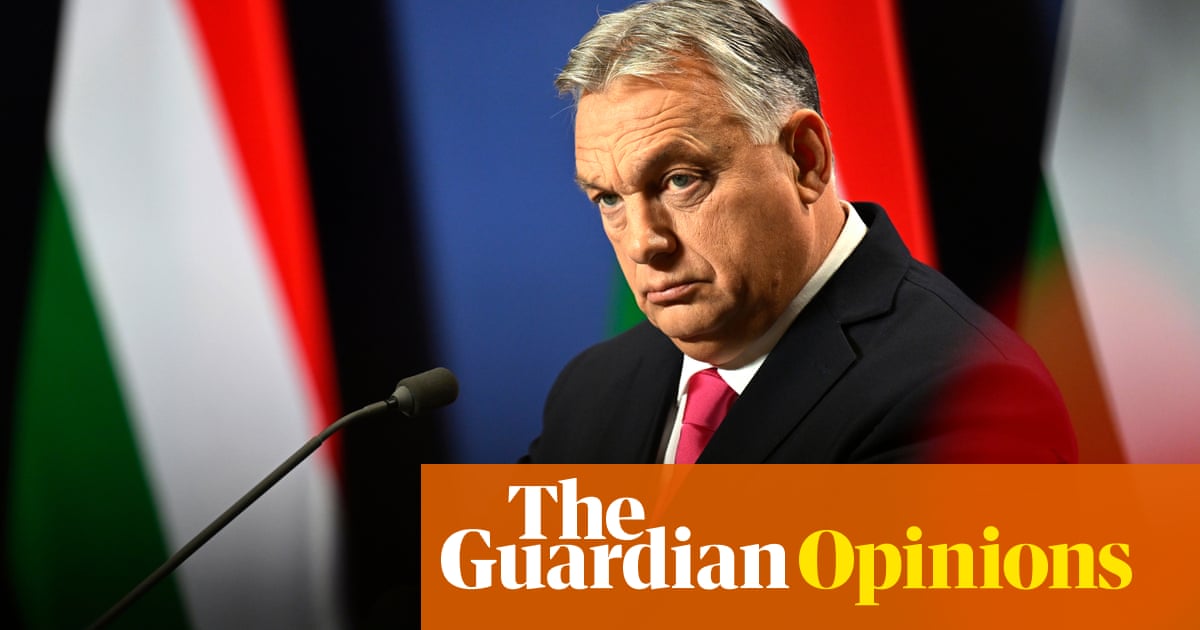
After nearly 14 years running Hungary, Viktor Orbán’s regime is crumbling under the weight of its own hypocrisies. The country’s president, Katalin Novák, a close Orbán ally, was forced to resign in disgrace earlier this month for issuing a pardon to a man convicted of helping cover up a sex abuse case at a children’s home. The former justice minister, Judit Varga, who approved the decision, also quit. This followed a tumultuous week of public outcry and protests in Budapest.
The scandal has not only rocked Orbán’s autocratic government to its core, it has laid bare the phoney nature of his self-declared Christian, family-values agenda. It has also exposed what little power even high-ranking political figures wield under Orbán’s de facto one-person rule: at the drop of a hat, he appears ready to dispose of close allies, even the supposedly independent president of the republic, to avoid accountability himself.
The scandal goes back to April 2023, when Novák granted a clutch of presidential pardons to mark the occasion of a visit to Hungary by Pope Francis. Details of such pardons are typically kept opaque, but it was announced at the time that the far-right activist György Budaházy, convicted of terrorism and a range of other violent offences, was among them – with Budaházy riding out of jail on a horse.
It wasn’t until 2 February this year, however, that investigative journalists revealed that Novák’s pardons had included a man convicted of helping to cover up horrifying sexual abuse in a children’s home in Bicske. The extent of the abuse, between 2004 and 2016, was appalling. To protect his boss, the home’s deputy director aided in the cover-up. Novák’s pardon shortened this man’s sentence and cleared his criminal record.
Two former residents of the Bicske children’s home had courageously shared their stories with the Hungarian public to reveal the truth about those entrusted with their care. The pardon risks reopening their wounds, and potentially dissuading others from coming forward.
The motive behind Novák’s pardon in the child abuse case remains unclear. Reporters detailed the convict’s political ties to Hungary’s reformed church and Orbán’s party elite. While in her resignation speech Novák admitted making a mistake, her rationale remained under wraps. It is telling that Péter Magyar, Varga’s ex-husband, has accused senior figures within the regime of scapegoating Novák and Varga.
This episode exposes the sham at the Orbán regime’s ideological core, undermining his international efforts to forge political alliances based on a supposedly “pro-family” platform. Hungary’s carefully cultivated image touts “FAMILY-FRIENDLY HUNGARY” – a slogan displayed all over Budapest’s airport, among other places.
Both of the ousted politicians, young women amid Orbán’s army of ageing men, were instrumental in presenting this illiberal, far-right agenda abroad, giving it a human face. Varga was slated to lead the ruling party Fidesz’s list for the European parliament elections in June and there was speculation that she was to be Orbán’s new point person in Brussels. Novák symbolised the child-protection agenda, having served as minister for families and hosted the Budapest demographic summit, which brought together rightwing luminaries from Italy’s Giorgia Meloni and former US vice-president Mike Pence to Canadian psychologist Jordan Peterson.
While Novák’s role as Hungary’s president was largely ceremonial, she travelled the globe, discussing “the protection of traditional values and families” with Florida governor Ron DeSantis and even meeting tech mogul Elon Musk. With the rotten core of Orbán’s regime laid bare, one wonders how such summits will spin the narrative of family values in future.
Because to many of us, it has seemed clear that Orbán’s government uses child protection as a smokescreen for the repression of LGBTQ+ activists and for attacking western liberalism. A recent “child protection law” was used to ban the depiction of homosexuality to minors, echoing Russian law. Bookstores are even restricted, again for supposed child protection reasons, from selling certain works, such as Heartstopper, unless they are wrapped in plastic. Both Hungary’s opposition and the European Commission, backed by 15 EU governments, came out against the law as discriminatory and a violation of the democratic principles that underpin EU membership. Organisations campaigning on children’s rights across Europe said the law put children at greater risk. In response, Orbán’s propaganda machine branded his critics child abusers.
The contradiction of preaching child protection while presiding over a flawed state that fails to protect children is glaring. Hungary’s underfunded and dysfunctional institutions have allowed child abuse to continue for years, unchecked. Orbán’s authoritarian state fosters intimidation and impunity, undermining accountability and independent media. Journalists’ phones have been hacked with the military-grade spyware Pegasus, and there are regular smear campaigns against them.
But this case also offers a glimmer of hope. In light of the shrinking space for free media, it is all the more important to highlight the role of the few remaining independent outlets. From reporting on the child abuse victims to digging up the pardon itself and diligently following the unfolding case, Hungarian journalists have provided an immense service to the public. Opposition parties have amplified the case and taken to the streets to push for accountability.
The most pressing questions remain unanswered. Orbán has distanced himself from Novák and tried to shift blame. But nothing happens in the country without his approval: it was his appointee and close ally who granted this shameful pardon, and his government member who signed off on it. Along with Novák and Varga, his hideous regime needs to go.
Katalin Cseh is a Hungarian member of the European parliament for the Renew Europe Group












